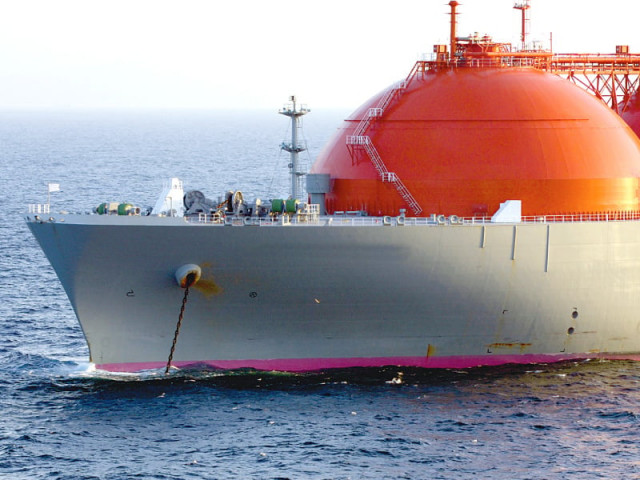Going-away present?: Pakistan looking at LNG import from Qatar
Cabinet to decide today as both nations try to resolve price row.

Two million tons of LNG per annum will be imported by Pakistan from Qatar, if the cabinet approves the plan. PHOTO: FILE
Pakistan is now contemplating the import of liquefied natural gas (LNG) from Qatar, after the Supreme Court took suo motu notice of the $25 billion LNG contracts bid and award process.
The government decided to strike a LNG deal with Qatar on a government-to-government contract ahead of expiration of the incumbent regime’s five-year tenure.
Pakistan and Qatar had already signed a memorandum of understanding to import LNG, but the process hit roadblocks over a pricing row after the latter demanded a price of $18 per million British thermal unit (mmbtu).
“Now, Qatar has cut the offered LNG price and the cabinet, scheduled to meet on Wednesday (today), may be requested to import two million tons of LNG per annum from Qatar on a government-to-government basis,” said Adviser to the Prime Minister on Petroleum and Natural Resources Dr Asim Hussain, while addressing a press conference on Tuesday.
Responding to a question regarding United States’ opposition to the Iran-Pakistan gas pipeline project, he said that different countries like Iraq and Kuwait were importing gas from Iran, whereas India and China were importing oil from the sanctioned-hit country.
“It is incomprehensible why the US is opposing the IP project when other countries are also importing gas from Iran,” he said, adding that the cost of the gas pipeline project stood at $1.35 billion. Initially, 150 million cubic feet of gas per day (mmcfd) will start from Iran, which will be enhanced to 750mmcfd.
“We have a gas sale purchase agreement for supply of 750mmcfd that could be increased to over one billion cubic feet per day of gas if the situation calls for it,” Hussain said.
However, he said that there was a hurdle in awarding the contract for laying Pakistan’s portion of the pipeline, but did not specifically mention what it was.
To finance the gas import project, the government can generate Rs40 to Rs50 billion per annum through the gas infrastructure development cess (GIDC).
If the current circumstances continue, Pakistan and Iran will use a barter trade mechanism as the mode of payment, exploiting a loophole in the imposed sanctions. The consumers will have to bear the cost in weighted average mode, he said
Moreover, Pakistan and Iran were scheduled to sign a MoU on establishing an oil refinery in Gwadar, which will be constructed by Iran, with a refining capacity of 400,000 barrels per day.
“After the announcement of the new petroleum policy, the government auctioned 60 new blocks with $372 million worth of work units, of which the Oil and Gas Development Company won 29 blocks,” he said, and went to say that exploration activities were on the rise after the implementation of the new policy as over 60 rigs were set for exploration. He said that one ship had reached for seismic survey for offshore drilling.
“We hope to find gas reserves offshore larger than the onshore fields like Sui and Qadirpur Pakistan has currently,” Hussain said.
The government was also set to divide gas utilities to minimise unaccounted for gas (UFG) losses and to bring reforms in accordance with the international standards.
Recently, United Energy Pakistan, which held a no objection certificate, will start a three dimensional seismic survey to explore offshore oil and gas reserves. The petroleum ministry had allowed the company to initiate survey in three blocks off the coast.
The minister argued that to terminate the prevailing energy crisis, the country needs to undertake the IP project, Turkemenistan-Afghanistan-Pakistan-India (TAPI) pipeline, LNG imports and liquefied petroleum gas air mix projects.
Furthermore to control the fertiliser prices, the government had arranged provision of gas to the fertiliser plants directly from the fields. The step will also help reduce prices of agricultural products and boost yields.
“The government has announced incentives for oil refineries that will invest $2.4 billion till December 2015 to upgrade plants to produce Euro-2 compliant diesel.
Published in The Express Tribune, March 13th, 2013.
Like Business on Facebook to stay informed and join in the conversation.



















COMMENTS
Comments are moderated and generally will be posted if they are on-topic and not abusive.
For more information, please see our Comments FAQ